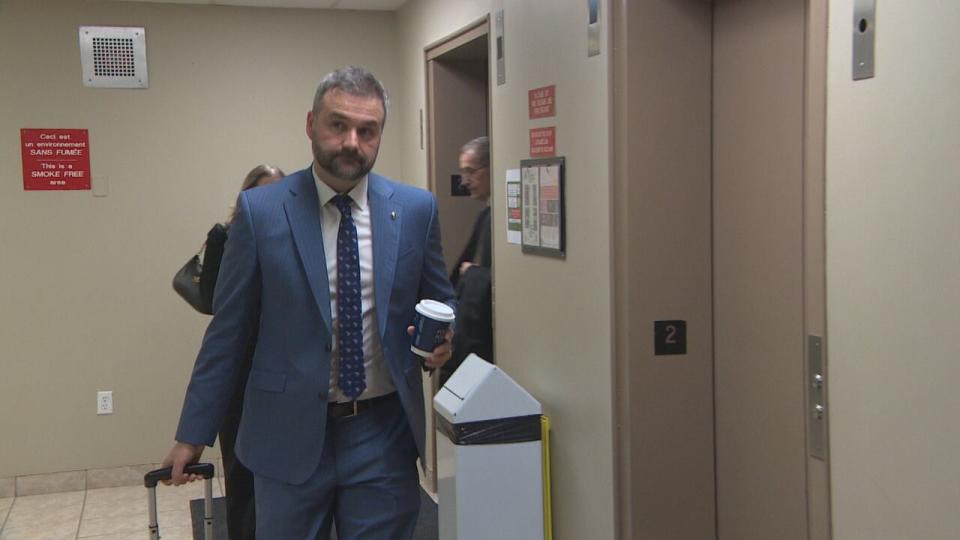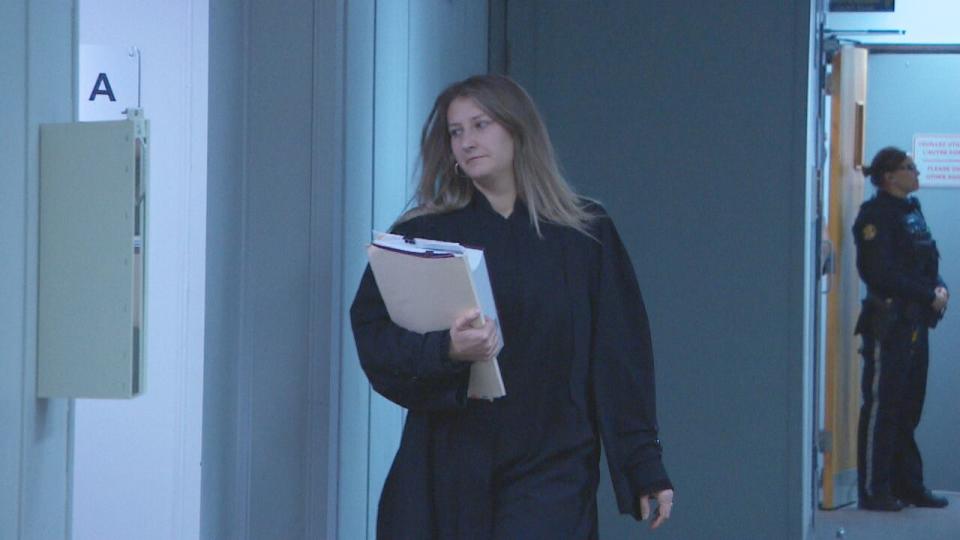High-profile former MP on trial for resisting, obstructing police
Bernard Valcourt, a former MP and cabinet minister, is on trial on charges of resisting and obstructing police. (Yves Levesque/Radio-Canada - image credit) A high profile and popular former politician in northwest New Brunswick went on trial Wednesday on charges of resisting and obstructing police during an episode stemming from a family dispute over a dementia patient's money. Bernard Valcourt, a former MP and cabinet minister in the governments of prime ministers Brian Mulroney, Kim Campbell and Stephen Harper, listened intently in an Edmundston court as staff from a local nursing home testified about the alleged incident.
"I said, 'Bernard, what are you doing? I've never seen you act like that,'" Jean-Anne Pelletier, the care manager at Villa des Jardins, told the court. Pelletier testified that she had known Valcourt for a long time, and he was "a happy man" but he also had a temper.
According to prosecutors, Valcourt, a lawyer, violated Section 129 of the Criminal Code on Oct.
4, 2022, when he "voluntarily obstructed" two Edmundston police officers and "resisted" them as they were trying to do their work.


In his testimony, Valcourt disputed the prosecution's account, telling the court a resident of the nursing home wanted to hire him as a lawyer, and she had the right to consult him without interference. "I tried to explain [to the police] and they didn't want to hear anything about it," he testified. The Crown is seeking a summary conviction that would carry no jail time.
The nursing home's manager, Diane Bouchard, told the trial that Valcourt arrived at the home on Oct.
4, 2022, to see Colette Cloutier, an elderly resident diagnosed with dementia. Bouchard said Cloutier's son Charles had power-of-attorney over her care and her legal affairs, so staff were concerned when Valcourt went to her room to meet with her alone. Bouchard confronted Valcourt in Cloutier's room and asked him why he was there.
Story continues "He said, 'It's none of your business.' I said, 'Yes, it's my business. Madame Cloutier has dementia, and she can't have discussions alone with a lawyer.'"
Valcourt's lawyer, Luc Roy, objected that prosecutors had introduced no power-of-attorney documents as evidence and said that would be key to the defence. "Mr. Valcourt had the right to speak to the lady....
That's the nub of the problem," he said. Valcourt testified that Cloutier was unhappy with what he referred to as "the so-called power-of-attorney" and wanted his legal advice.


Luc Roy is representing Bernard Valcourt in court in Edmundston. (Yves Levesque/Radio-Canada) He said he was there to get a sense of whether she was competent to make decisions about hiring him. Earlier, Bouchard had recounted calling Charles on her cell phone and putting him on speaker so he could find out what Valcourt was discussing with his mother.
Charles testified that he asked his mother, "It's your son Charles, what's going on there?" but his mother's answers weren't clear. "She was confused," he said. Valcourt contradicted that. Cloutier recognized him immediately from his years in politics. "Why, it's Bernard!" she declared when he arrived, according to his testimony.
Bouchard said after Valcourt cut off two attempts by Charles to speak to his mother, "I said, 'That's enough, I'm going to have to ask you to leave.' He sat down and said, 'I'm not leaving.'" In Valcourt's account, he insisted that the solicitor-client relationship was confidential and privileged and that he could stay. He also said Cloutier told her son over the phone, "I'm finished with you....
I can make decisions for myself." When the police arrived, Bouchard testified Valcourt became confrontational and was yelling, which alarmed a tearful and confused Cloutier.


Annie-Claude Breton, a prosecutor from Quebec, is handling the trial because of Valcourt's high profile and network of connections in the New Brunswick legal system. (Yves Levesque/Radio-Canada) Police testified Valcourt told Cloutier not to answer their questions and he refused to co-operate with them. "He said if I wanted him to leave, I was going to have to make him leave," Edmundston police Const.
Samuel Cote testified. But Roy, Valcourt's lawyer, suggested during his cross-examination of Cote that the situation wasn't that clear-cut. He played police dispatch audio of the confrontation in which Cloutier can be heard saying of Valcourt, "I hired him" and asserting, "I have a right to talk to him."
The officers said Valcourt resisted their efforts to handcuff him, though Valcourt disputed that. Getting up out of the witness stand to act out the arrest, waving his arms, he said when the officers cuffed him, "It felt like they were tearing my arms out of the sockets." According to testimony from Bouchard, Pelletier and another nursing home employee, Melissa Martin, staff at the home were frequently caught in the middle of a dispute within Cloutier's family, and in particular between two of her sons.
Valcourt said there was no feud but that Cloutier's other son, Philippe, had contacted him to tell him his mother wanted him as a lawyer. Pelletier said some family members accepted she had dementia and others did not. There were disagreements about money, she added, and the sale of her house came up during Valcourt's visit.

Prime Minister Stephen Harper welcomes Bernard Valcourt at the start of caucus meetings in Ottawa in June. Then-prime minister Stephen Harper with Bernard Valcourt in 2011. Valcourt was a cabinet minister in the Harper government. (Adrian Wyld/Canadian Press)
Valcourt had two stints as a federal MP, first from 1984 to 1993 as the MP for Madawaska-Victoria and then from 2011 to 2015 as MP for Madawaska-Restigouche. He resigned from the Mulroney cabinet in 1989 after pleading guilty following a drunk-driving accident, but was reappointed in 1990. He was also leader of the New Brunswick Progressive Conservative party, taking the party to defeat in the 1995 provincial election.
His personal popularity in the region was always high, with a walking bridge over the Madawaska River named in his honour. But in 2021, some local residents launched a petition to remove his name from the bridge after he accused media organizations of quoting a local doctor as part of "a campaign of terror" about COVID-19. The trial is expected to conclude Thursday, with the prosecution's cross-examination of Valcourt and closing arguments.
A prosecutor from Quebec, Annie-Claude Breton, is handling the trial because of Valcourt's high profile and network of connections in the New Brunswick legal system.
